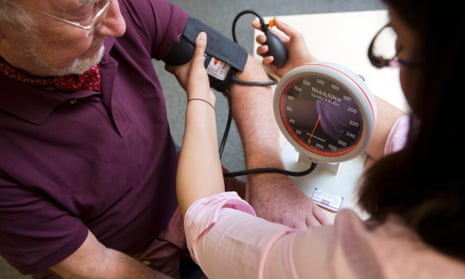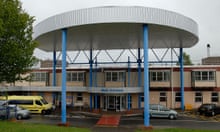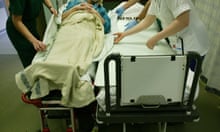Intolerably long waiting times to see a GP have become a national disgrace that could endanger people’s health, the leader of Britain’s family doctors has warned.
Increasingly unacceptable waits for an appointment risk illnesses not being spotted quickly enough and chances to prevent them being missed, said Dr Maureen Baker.
The chair of the Royal College of GPs spoke out as NHS figures showed that one in six patients have to wait at least a week before they see a GP or practice nurse.
A total of 58.9 million patients in England are set to have waited for a consultation for a week or more by the end of 2014. This figure, which is based on individual consultations so includes patients who have faced such waiting times more than once, is up almost 50% from the 40 million who waited that long in 2012, according to a new RCGP analysis of data from NHS England’s six-monthly GP patient survey.
“These devastating statistics show that waiting times are now a national disgrace and that the situation is set to get even worse over the year ahead,” Baker said.
“Even more worrying is that we have no way of finding out how many patients decide not to seek treatment because they cannot get an appointment, which means we might be missing opportunities of detecting illnesses at an early stage or preventing them happening in the first place.”
The 58.9m minimum week-long waiters revealed in the most recent GP patient survey, which encompasses the views of about one million patients, was also a sharp rise on the 47m such waits in 2013.
Patients are bearing the brunt because there are too few GPs to meet the rising demand for their services and those in post are overworked and overstretched as a result, Baker said.
“Expecting patients to wait a week before they can be seen by their GP is unacceptable. We cannot gamble with people’s health in this way. Unless we invest substantially in expanding the GP workforce, general practice is at risk of going into meltdown, with the profession’s ability to deliver decent patient care increasingly compromised,” he said.
The proportion of patients waiting at least a week has been creeping up. In mid-2011 it was 13%, though rose to 14% by the end of 2013, then reached 15% in mid-2013 and then 16% in July, according to the GP patient surveys.
A new ComRes opinion poll commissioned by the RCGP found that half of the 1,001 adults surveyed agreed that waiting times were “a national disgrace”. Three in 10 (29%) said that the last time they tried to book a GP appointment they could not get one within a week. And just 23% believe there are enough family doctors to meet the needs posed by the ageing and growing population. Two-thirds think GPs’ seeing up to 60 patients a day is a threat to the standard of care family doctors can provide. And six in 10 (60%) support general practice receiving more NHS funding – a key RCGP demand.
Its share of NHS spending in England fell from 10.95% in 2005-06 to a record low of 8.39% in 2012-13, despite GP surgeries treating about 40 million more patients a year than five years ago. The average number of consultations undertaken by each GP has also risen over that period, from 9,264 to 10,714.
The health secretary, Jeremy Hunt, has found over £1bn extra for the NHS in the last year, but almost all that has gone to hospitals.
GPs’ workload and the risk of burnout is thought to be a key reason for a decline in the number of newly qualified doctors choosing to become GPs. The situation is now so serious that medical graduates should have their student loans paid off in return for agreeing to train as GPs and work in either deprived areas or parts of the country that have too few family doctors per head of population, the RCGP says.
Baker said financial incentives, similar to those offered to newly qualified teachers to work in certain places, may help arrest the decline. The government has committed to increasing the proportion of medical graduates going into general practice to 50%, from 40% who do so now.
The Department of Health said: “The latest GP survey actually shows that the vast majority of patients –85% – can get an appointment within a few days. But to increase convenience for patients we’re also going further by offering 7.5 million more people email, skype and evening and weekend slots.”
Dr Mike Bewick, deputy medical director for NHS England, said: “GPs are working hard, but patients should be able to get appointments. We want to give frontline GPs in clinical commissioning groups the power to invest more in primary care, while also modernising the way GPs work, with greater use of telephone, email and video consultations, as well as more flexible appointment times, including opening in the evenings and at weekends.”











Comments (…)
Sign in or create your Guardian account to join the discussion